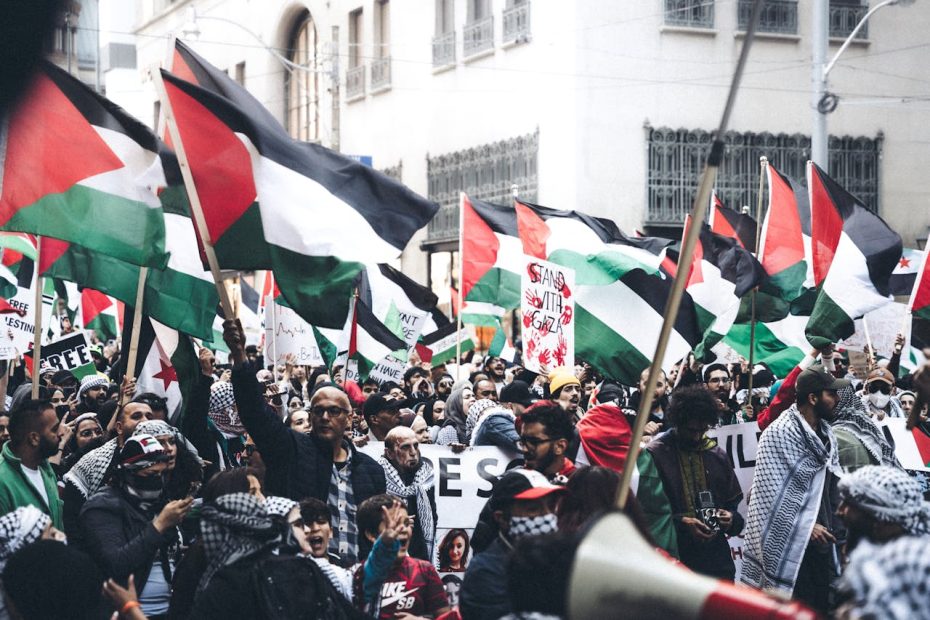I got out of Gaza. I escaped the rubble, the bodies, and the nightmare that was my home. You’d think leaving all that behind would bring some kind of peace. But it didn’t. All I feel is emptiness. I thought once I was safe, I’d be able to mourn, to let it all out for the lives lost and the people I left behind. But there’s nothing.
Now, I’m far from the violence, surrounded by people who live normal lives. They worry about things like traffic, bad days at work, or arguments with their partners. I just stare at them. How can they not see how small those problems are? I’ve seen kids ripped apart in the streets, families vanish in an instant. And now I’m supposed to smile and nod through casual conversations? I can’t.
People want me to tell my story. They think sharing it will help, like it’s some kind of therapy. But when I talk about it, it doesn’t feel real. I describe the screams, the destruction, the deaths, but it’s like I’m talking about someone else’s life. My emotions stayed behind, buried under the rubble.
I don’t feel anything anymore. A close friend didn’t make it out—I didn’t cry. I hear about others losing everything, and it doesn’t touch me. I go through the motions, pretending to care, but inside, there’s nothing.
People think escaping the horrors means I survived. But that’s not true. A part of me died there, the part that felt, the part that cared. Now, when I see the news or hear stories of people still suffering, it’s like I’m numb. Even when I walk past someone begging, I don’t feel moved to stop.
On the outside, I look fine. I smile, I work, I have conversations. But inside, I’m as broken as the streets I left behind.
It’s been five months, and I’m still lost.
My Advice
I’m so sorry you’re feeling this way. What you’re experiencing sounds like a deep emotional trauma response, and it’s not uncommon for people who have lived through extreme events like war. Let’s break this down step by step because healing is a process, and you don’t have to face it alone.
1. Understand That Numbness is a Defense Mechanism
- Your mind and body are protecting you from the overwhelming pain you’ve been through. Feeling “nothing” is a way to cope when emotions are too intense to process all at once.
- Try not to judge yourself for this. It doesn’t mean you’re broken or incapable of feeling; it just means you’re in survival mode.
2. Give Yourself Permission to Grieve
- You’ve experienced unimaginable loss, and grieving is a necessary part of healing. It’s okay if it doesn’t come right away. Start small—write down memories or talk to someone you trust, even if you feel detached.
- There’s no timeline for grief. Be patient with yourself.
3. Start Therapy with a Trauma Specialist
- A therapist who specializes in trauma, especially in war or crisis survivors, can help you process your experiences in a safe way.
- Techniques like EMDR (Eye Movement Desensitization and Reprocessing) or somatic therapy could help unlock some of those buried emotions without overwhelming you.
4. Practice Grounding Techniques
- When you feel numb or detached, grounding exercises can help reconnect you to the present moment:
- Focus on your senses: What can you see, hear, touch, or smell right now?
- Try breathing exercises: Breathe in for 4 seconds, hold for 7, and exhale for 8 seconds. It calms your nervous system.
5. Find a Safe Space to Talk
- Sharing your story is hard, but finding a group of people who’ve been through similar experiences can make it feel less isolating. Look into support groups for refugees or trauma survivors.
6. Reconnect to Humanity Slowly
- Helping others, even in small ways, can bring back a sense of purpose. Volunteering or simply listening to someone else’s struggles might help you rediscover empathy without forcing it.
7. Focus on Small Steps Toward Joy
- Right now, big emotions feel impossible. Start with little things that used to make you happy—listening to music, spending time in nature, or even enjoying a good meal.
8. Set Boundaries with Others
- It’s okay to step away from people who don’t understand your experience or who trivialize it. Surround yourself with those who are patient and supportive.
9. Recognize That Healing Takes Time
- You’ve been through so much, and it’s okay if healing feels slow. Every small step forward—seeking help, opening up, or finding moments of peace—is progress.
You don’t have to do this on your own. Seeking professional help, leaning on supportive people, and taking it day by day can make the journey feel less overwhelming. You’ve survived so much already; healing is the next step, and you are capable of it.
Thank you for reading! If this post helped you, share it to help others too!
Leave your comment below, I’d like to read your thoughts.
